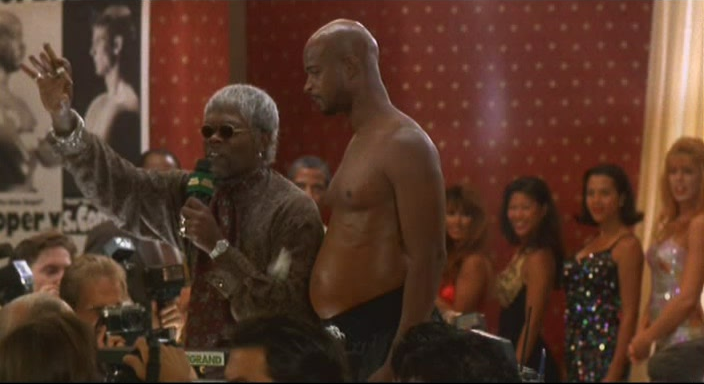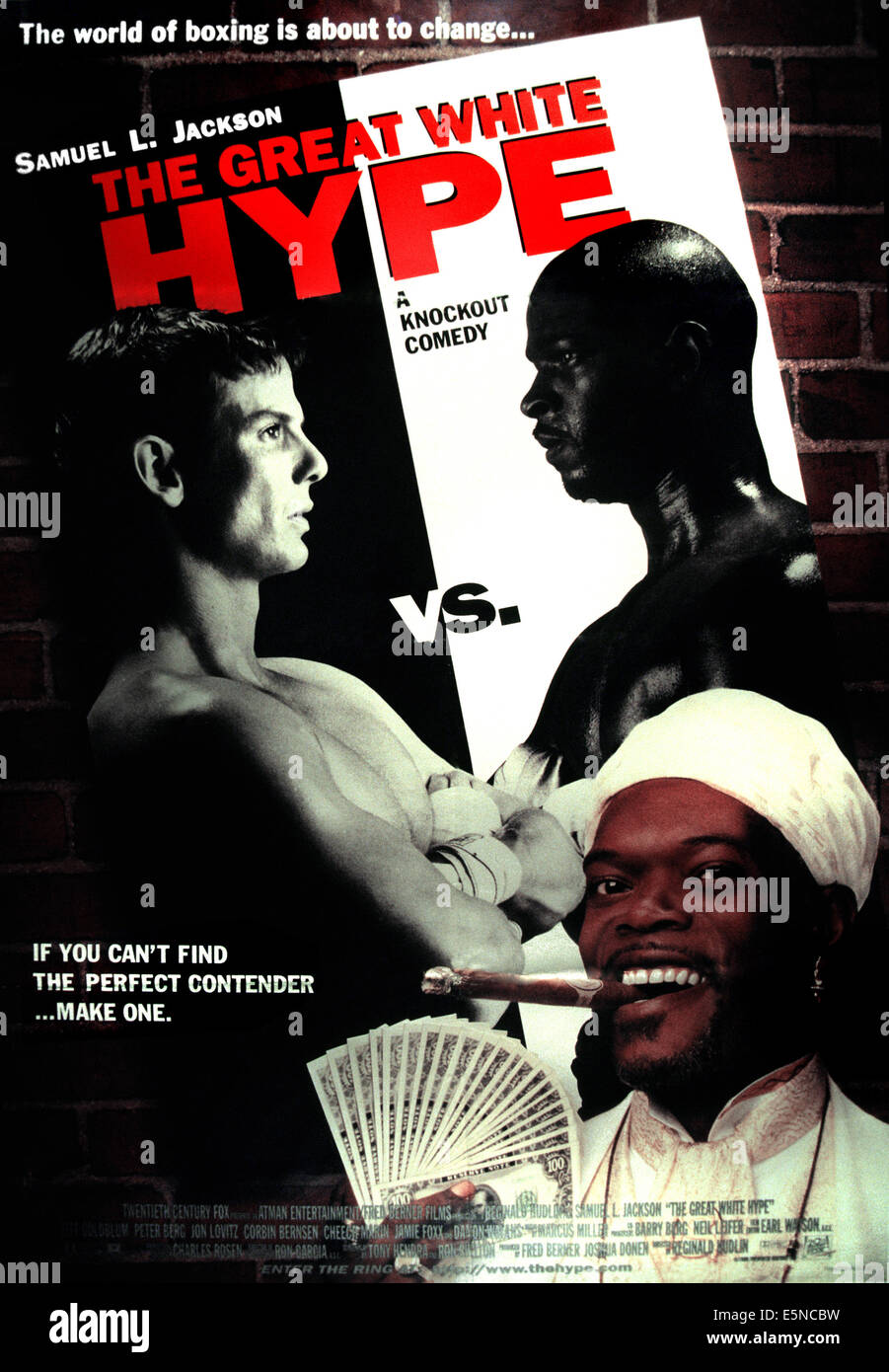Director: Reginald Hudlin
Still a vastly underrated satire of the last gasps of boxing as a premier sport in the US.
Released in 1996 and obviously drawing heavily on the realities of the boxing world at the time, The Great White Hype tells the tale of the attempt to find a challenger to the current undefeated heavyweight champion, James "The Grim Reaper" Roper (Damon Wayans). But the problem is not that legitimate challengers don't exist - it's that the sport is rapidly fading in popularity, resulting in ever-decreasing profits for those who seek to profit from the once-wildly-lucrative industry. Seeking to crack this nut is Reverend Fred Sultan (Samuel L. Jackson), a Don King-like figure who is a shifty, manipulative promoter not above anything it takes to make a huge payday for himself. The grand solution, as he sees it, is to find a modern rarity - a white boxer who can square off against Roper and encourage greater interest through subtle and not-so-subtle race-baiting of the viewing public. The obvious problem, though, is that there isn't a decent white heavyweight fighter anywhere on the scene. The Sultan's solution? Concoct one. The Sultan and his team of sleazy underlings find heavy metal rocker Terry Conklin (Peter Berg), who had once beat the champion Roper when the two were amateurs. The rather dim Conklin hasn't fought in about a decade, but the Sultan convinces him to return to the ring, all the while whipping up a huge marketing campaign around the first black-versus-white heavyweight title bout in ages.
I hadn't seen this movie since my college days back in the mid- and late-1990s, when I watched it several times and would regularly quote it with my friends. While I would never argue that it's a "great" movie, I'm still somewhat baffled that it's not given more respect as a funny, clever sports satire. I was actually completely unaware of its theatrical release, despite its having several well-known actors like Samuel L. Jackson, Jeff Goldblum, and plenty of others. A little research shows that it wasn't very well received by critics at the time, and still sports very mediocre reviews on any major film ratings site. My only guess is that the R-rating and slightly loose feel to the film may have turned off some viewers. Also, being a satire of a notoriously seedy sports industry, the movie derives a lot of its humor and message from the darker aspects of human nature. There is also a chance that, like me the first time I watched it, viewers didn't know what to make of the ending. For my part, I hadn't picked up on just how satirical the entire story was meant to be, until a friend explained it to me. Once I understood that, the movie actually went considerably up in my estimation.
The greatest strength here is the comedy, on all of its levels. You have plenty of broad humor, often in the form of sharp insults hurled back and forth between the fighters, promoters, and various hangers-on and greedy leeches who populate the world of pro boxing. And there's plenty of great physical humor, too, often in the form of subtle facial expressions or body movements, courtesy of brilliant comic actors like Jackson and Goldblum, but also veteran comedians like Damon Wayans, Jamie Foxx (before he showed us his serious dramatic chops a few years later), Jon Lovitz, and plenty of others. The timing and delivery of everything is spot-on; so much so that my wife, who has no great interest in boxing, was laughing plenty throughout the show. On top of the more obvious comedy is the satire element. Anyone with the slightest sense of the corruption and greed rife in boxing, coming to a fatal crescendo in the 1990s, can see that the movie knew just what to target. Perhaps the greatest fault of the sport is the comic element in The Great White Hype that's easiest to overlook - that of the Marvin Shabazz character. In the movie, Shabazz is presented as a true, legitimate contender to the champion Roper. But just as often happened in boxing in its final waning years, fractures and corruption in and around the sport prevented fans from seeing the actual two best fighters square off against each other. It was a slow, bitter pill for fans and aficionados of boxing to swallow, and it's what ultimately saw the long-popular sport slip so far down in the sports-viewing public's consciousness. By the end of the 1990s, MMA fighting was on the upswing and soon took over boxings coveted place as a wildly popular combat sport.
Still a vastly underrated satire of the last gasps of boxing as a premier sport in the US.
Released in 1996 and obviously drawing heavily on the realities of the boxing world at the time, The Great White Hype tells the tale of the attempt to find a challenger to the current undefeated heavyweight champion, James "The Grim Reaper" Roper (Damon Wayans). But the problem is not that legitimate challengers don't exist - it's that the sport is rapidly fading in popularity, resulting in ever-decreasing profits for those who seek to profit from the once-wildly-lucrative industry. Seeking to crack this nut is Reverend Fred Sultan (Samuel L. Jackson), a Don King-like figure who is a shifty, manipulative promoter not above anything it takes to make a huge payday for himself. The grand solution, as he sees it, is to find a modern rarity - a white boxer who can square off against Roper and encourage greater interest through subtle and not-so-subtle race-baiting of the viewing public. The obvious problem, though, is that there isn't a decent white heavyweight fighter anywhere on the scene. The Sultan's solution? Concoct one. The Sultan and his team of sleazy underlings find heavy metal rocker Terry Conklin (Peter Berg), who had once beat the champion Roper when the two were amateurs. The rather dim Conklin hasn't fought in about a decade, but the Sultan convinces him to return to the ring, all the while whipping up a huge marketing campaign around the first black-versus-white heavyweight title bout in ages.
I hadn't seen this movie since my college days back in the mid- and late-1990s, when I watched it several times and would regularly quote it with my friends. While I would never argue that it's a "great" movie, I'm still somewhat baffled that it's not given more respect as a funny, clever sports satire. I was actually completely unaware of its theatrical release, despite its having several well-known actors like Samuel L. Jackson, Jeff Goldblum, and plenty of others. A little research shows that it wasn't very well received by critics at the time, and still sports very mediocre reviews on any major film ratings site. My only guess is that the R-rating and slightly loose feel to the film may have turned off some viewers. Also, being a satire of a notoriously seedy sports industry, the movie derives a lot of its humor and message from the darker aspects of human nature. There is also a chance that, like me the first time I watched it, viewers didn't know what to make of the ending. For my part, I hadn't picked up on just how satirical the entire story was meant to be, until a friend explained it to me. Once I understood that, the movie actually went considerably up in my estimation.
 |
| The Sultan hyping up the fight in front of the champ, "The Grim Reaper" Roper. Roper's disdain for his opponent manifests itself as an utter refusal to even train for the fight. |
Anyone who enjoys boxing really should give this one a watch, and I would also recommend it to anyone who can appreciate a solid R-rated satire of any form of entertainment. The comedy and acting are enough to give you some good laughs, even if you don't have any great care about boxing.

No comments:
Post a Comment